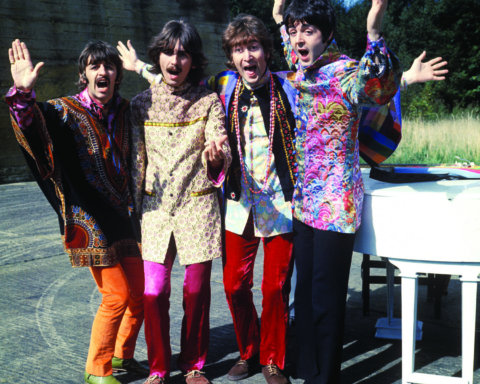
By Brian Howell
Denver Broncos executive vice president John Elway and head coach Gary Kubiak shared a laugh and a hearty embrace as they stood on the podium and awaited the presentation of the Lombardi Trophy.
As they hugged, Kubiak said to his boss and long-time friend, “You can win it all kind of ways, baby! You can win it all kind of ways!”
On that night, Feb. 7, the Broncos came away from Super Bowl 50 with a 24-10 win against the Carolina Panthers, capping what was truly one of the most unusual championship seasons in NFL history.
With a new head coach, a banged-up quarterback writing his final chapter and an offensive line that struggled to block anybody, the Broncos somehow managed to ride their sensational defense and get just enough from the offense to come away with their third Super Bowl championship.
“I think that the credit goes to the players buying into what we were doing, understanding that we could get it done this way (and) that there’s not just one way to win,” Kubiak said after the Super Bowl. “You can win doing some of the things we’ve been doing. I think it’s just (to) their credit (and) hanging in there. Over the course of this past month, they’ve been committed to getting it done, and everyone has been all the way in.”

What made this such a unique championship was how the Broncos balanced an all-time great defense with an awkward mess at quarterback. They did it all while adjusting to a new coaching staff, as Kubiak became just the fourth head coach in history to win a Super Bowl in his first season with the team.
The Broncos figured to be in good shape at quarterback with future Hall of Famer Peyton Manning. Arguably the greatest quarterback in NFL history, Manning has more passing yards (71,940) and touchdowns (539) than anyone who has ever played the game.
The 2015 Manning was unrecognizable, however. Instead of carrying his teams to victories and slicing up defenses, the 39-year-old Manning was more of a liability. Through eight games, the Broncos were 7-1, but Manning had thrown just nine touchdowns and 13 interceptions.
Game 9, at home against Kansas City, was supposed to be a celebration for Manning, who picked up the last three yards he needed to become the NFL’s all-time leading passer. The rest of the game was a nightmare, though, as Manning threw four interceptions. After the fourth pick – his league-leading 17th – early in the third quarter, Manning was benched for the first time in his career.
Various injuries led to Manning’s poor performance and benching, Kubiak said, and the Broncos handed the keys to the offense to young Brock Osweiler.
“I’ve prepared for this moment, obviously, for a very long time,” said Osweiler, who had, to that point, spent his entire three-and-a-half-year career as Manning’s backup. “I never wasted a single day. It’s a dream come true. It really is.”
Over the next six weeks, Osweiler guided the offense and led the Broncos to a 4-2 record, including a win against the undefeated New England Patriots. While not spectacular, Osweiler was better than Manning.
Manning spent most of those six weeks working by himself as he nursed his injuries and prepared to play. Many people questioned whether Manning would ever play again, especially as Osweiler appeared to lock up the job.
Manning, however, wasn’t about to let that dreadful game against the Chiefs be the final image of him as a player.
For the Week 17 finale against San Diego, Manning was again in uniform, this time as a backup for the first time in his career. Osweiler and the offense sputtered that afternoon, and Kubiak added a bit more drama to the situation. Osweiler was benched in the third quarter, and Manning rallied the Broncos to a 27-20 victory.
As the drama at quarterback unfolded during the regular season, the defense was Denver’s saving grace. Led by charismatic linebacker Von Miller and veteran coordinator Wade Phillips, the Broncos had the best defense in the NFL in 2015. The Broncos led the league with 52 sacks and gave up fewer yards than anyone.
It was the defenses’ knack for making game-winning, game-changing and game-saving plays that was most remarkable.

Photo by Gabriel Christus
Cornerback Aqib Talib had a 51-yard interception return for a touchdown that keyed a Week 1 win against Baltimore. In Week 2, Bradley Roby scooped up a Kansas City fumble in the final 30 seconds of the game and ran it back 21 yards for the game-winning touchdown.
Interception returns for touchdowns keyed three other Broncos wins. Twice, the Broncos secured wins by forcing fumbles in the final minute of regulation or overtime. Seven times, they held the opposition to 15 points or less.
“We almost led the league in every category, so we’ve got to say this is a special, all-time defense,” Phillips said.
After a stellar regular season, the Broncos defense was eager for the postseason. So was Manning, who had been declared the starter once again.
“Any time something is taken away from you due to health, it does (mean more to get it back),” Manning said before the playoffs began. “When you’re not out there playing, it certainly does remind you how fortunate you are when you have the opportunity to be healthy and be ready to play.”
Manning wasn’t brilliant during the playoffs, but he did his part to help the Broncos beat the Pittsburgh Steelers, 23-16, in the divisional round, and the Patriots, 20-18, in the AFC championship game.
The defense was exceptional in both games, forcing a pivotal fumble against the Steelers, and battering Patriots quarterback Tom Brady.
Somehow, the Broncos had cooked up a recipe to return to the Super Bowl for the eighth time in franchise history.
For Kubiak, it was his sixth Super Bowl with Denver. As Elway’s backup quarterback in the late 1980s, Kubiak got to three Super Bowls. In 1997 and 1998, Kubiak was the Broncos’ offensive coordinator. Those late ‘90s teams, led by Elway at quarterback, were exceptional on offense and defense and won both Super Bowls.
This Super Bowl, played at Levi’s Stadium in Santa Clara, Calif., proved to be a perfect microcosm of Denver’s season.
The Manning-led offense struggled – gaining just 194 yards, the fewest total ever by a Super Bowl champion – while the defense turned in a dominating performance.
Against the top-ranked Panthers’ offense, the Broncos registered a Super Bowl-record seven sacks, with Miller, who was named the game’s MVP, getting 2.5 of those. On Miller’s first sack, he stripped the ball from Carolina quarterback Cam Newton, and the Broncos’ Malik Jackson fell on the ball in the end zone for a touchdown. On Miller’s last sack, he again stripped the ball from Newton; the Broncos recovered and set up the offense for one last touchdown.
“It’s so surreal,” Jackson said of winning the championship. “I was here two years ago when we lost it (to Seattle in Super Bowl XLVIII). Just to have that feeling from this to that, it’s just awesome. It’s truly a blessing just to be with these guys, be a part of this and be able to kind of go out there and dominate like we did today.”

Photo by Gabriel Christus
Ultimately, it was Manning in the spotlight. After 14 seasons with the Indianapolis Colts – including a victory in Super Bowl XLI – he was released in 2012 because the Colts were unsure if he could recover from a neck injury that caused him to miss the entire 2011 season. Manning knew he could still play, though, and he came to Denver in 2012.
For three years, from 2012-14, Manning put up insane, record-breaking numbers, but he and the Broncos always fell short of that championship goal. Finally, he and the Broncos completed their quest together in 2015.
No, Manning didn’t play well this past season, but his final moment as a player, clutching the Lombardi Trophy in his hands, was befitting a man who had been sensational for so long. One month after the Super Bowl, Manning announced his retirement from pro football.
“It was extremely gratifying to finish with a world championship,” Manning said. “There’s no question this was a unique season and it had plenty of ups and downs.”
For the Broncos and their fans, though, the season finished on an up, and for the first time in 17 years Denver celebrated a Super Bowl championship. And, boy, did the fans celebrate. Two days after the Super Bowl, an estimated 1 million Broncos fans flooded the streets of downtown Denver for a victory parade.
“In terms of raw emotions from fans and raw passion, there’s really nothing like it,” Broncos president and CEO Joe Ellis said. “We are very, very lucky to have the support of this entire region, this community and the best fans in the NFL.”
In 2015, the Broncos had not only the best fans, but the best team, as well.








